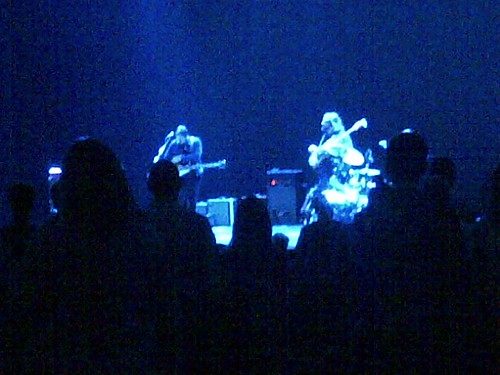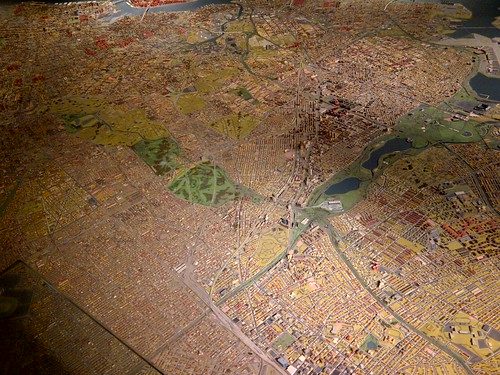Earlier this year I was watching Saturday Night Live and, as usual, I was paying more attention to my computer than to the TV screen. The musical act was on and I was half-listening when suddenly my ears sent a message to my brain to get off the computer and pay attention to the music. Sturgill Simpson made me sit up and take notice. When Mrs. Devereaux had a ticket to his show at Radio City Music Hall that she couldn’t use, I jumped at the chance to see him.
Radio City Music Hall is the showplace of the US. It’s got a beautiful Art Deco exterior and interior. When I was a kid, we’d sit up in the balcony and see a movie and a show. And the show included the world-famous Rockettes. I’ve been up in the balcony for more recent concerts but years ago, when ticket prices were less expensive, I sat in the orchestra for shows by Leon Russell, Tony Bennett, and The Pretenders with the B-52s. But with this ticket I was back in the orchestra – just behind the mid-orchestra railing, which meant there was an aisle between my row and the front orchestra and I had an excellent view that even a tall person couldn’t take away. Sigh. If only it was that easy.
At exactly 8pm, Fantastic Negrito took the stage. The first thing I wrote down was Voodoo Rock. Fantastic Negrito (born Xavier Amin Dphrepaulezz) describes his music as black roots music or blues with a punk attitude. From the stage, Fantastic Negrito talked a lot about being reborn. He grew up in an orthodox Muslim household, where he heard mostly traditional African music. The family moved to Oakland, where Fantastic Negrito was introduced to funk. He taught himself all the instruments. His first musical career flamed and burned quickly. He was in a terrible car accident where his playing hand was mangled – on stage he told us the story of Les Paul and how, after an accident, he had his arm set so that he could continue playing guitar. Fantastic Negrito took to living a quiet life that included growing and selling pot but after his son was born, he started creating again and instead of looking at what was presently happening, he went back to the blues. In 2017, he won a Grammy for Best Contemporary Blues Album.
“I am Fantastic Negrito and I’m the only one. I know because I Googled it.”
He was joined on stage by Nathan Pedley (electric bass), Lionel LJ Holoman (organ), Tomás Salcedo (electric guitar), Joshua Nash (keyboards), and DaQuantae “Q” Johnson (drums) (I believe I have the names correct – he lists more musicians on his Facebook page and looking at past reviews all those musicians have played with him at some time. I’m going by photographs.) Fantastic Negrito is very charismatic and with the blues and R&B influences he reminded me of Sly Stone at his peak. Sly and the Family Stone without the horns.
His one cover was “In the Pines” (also known as “Where Did You Sleep Last Night?” and “Black Girl”). It’s a traditional song performed by many artists and made famous by Leadbelly and then Bill Monroe and later by the Four Pennies. Recently it has become better known as a song that Nirvana performed on MTV Unplugged. Fantastic Negrito changed the bridge and some of the words but it he said it was still a cover. And he made apologies to Nirvana. Fantastic Negrito’s version was certainly one of the best I’ve heard.
The audience for Fantastic Negrito was sparse but those of us there enjoyed his set immensely and were certainly wanting more.
Photos aren’t good because of the camera phone and the bright lights on stage.
Sturgill Simpson is a country and roots singer, who adds a whole lot of rock into his music. As soon as the band got on stage, most of the audience stood. Now my seat wasn’t so great and I couldn’t see. Sometimes they’d sit for a quieter song but for most of his set they were on their feet. Even if I stood, I couldn’t see. That was disappointing but music is to be listened to and that I did. Once again, his band blew me away. It was smaller than the band he had on SNL (the horns were gone) but there was just as much power and energy. He’s another artist who isn’t shy about talking about his alcoholism and his sobriety. He was born in Kentucky, was in the Navy, and worked for Union Pacific Railroad. So, like other Nashville artists before him, he lived a real life before becoming a well-known musician.
Band members are Chuck Bartels (electric bass), Bobby Emmett (organ), and Miles Miller (drums/backing vocals). Most of the songs had long instrumental breaks – sometimes for the intro and other times the outro. (One break went into “Enter Sandman” for a bit.) And sometimes the break was in the middle of the song. It all sent me back to late 60s and 70s when that was the norm. The quieter songs did not have the breaks. Simpson kills on electric and acoustic guitar. But Emmett is the star with his incredibly intricate and ballsy organ playing.
Simpson has that deep southern voice that I love so much. He said that three years ago he’d played at Hill Country BBQ and there were about 20 people in the audience, none of whom were there to see him. And here he was three years later with a sold-out show at Radio City Music Hall. He thanked the audience and said it was all because of us. Simpson seems like a very humble guy, who appreciates what he has. At one point, he thanked us and said he was having a hard night and we were making it better.
The songs were rock, country, blues, funk, a little gospel with the organ thrown into the mix. Because I’ve always been a fan of the slow sad songs, I especially enjoyed Simpson’s solo set on acoustic guitar. “Could You Love Me One More Time,” “Oh Sarah,” and “Long White Line” were all beautifully done and highlights of the solo set. The audience especially enjoyed the honky-tonk of “Life of Sin.”
The band came back on stage and Simpson said that one of the things about playing these big fancy rooms is that they have a curfew. After the boos from the audience, Simpson said, “I don’t make the rules, I just break them. But I worked for the railroad and I was in a union and I have a lot of respect for these guys.” So he wasn’t breaking the rules this night. Most songs were played one into the other to save time and there were just two more songs (one was a Freddie King cover) before they left the stage and did not come back for an encore because it was 10:45pm.
Simpson’s setlist can be found here on setlist.fm.
By Carene Lydia Lopez








